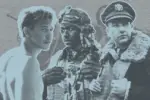The wait is finally over. Baz Luhrmann’s “Elvis” hit theaters this month and, as expected, did not disappoint. Currently, the film has accrued $124.2 million at the box office. The film navigates the dark, untold life story of the late King of Rock ‘n’ Roll, Mr. Elvis Presley. Impressively, this Luhrmann project is one that has been in the works for 14 years and has stirred much anticipation. After such a long wait, the film’s release has become all the more exciting — so much so that the film’s premiere at the Cannes Film Festival received an impressive 12-minute standing ovation.
Back in May, the Met Gala provided viewers with the first look at the cast members, including Austin Butler, who was styled head-to-toe in Prada, as well as his costar, Olivia DeJonge, who portrayed Priscilla Presley; also present were family members of Presley. Fans took notice of Butler’s seemingly new voice. Interestingly enough, Butler later acknowledged this slight but noticeable change — especially in comparison to past work — as him still speaking in his “Elvis voice.”
Because of this online joke, many expressed their doubts about Butler, claiming he was silly and would not be able to pull off an accurate representation of Elvis Presley. Of course, the skeptics were wrong.
In fact, Butler’s portrayal of Elvis in this film is so uncanny that for the 159 minutes you have tuned in, you will believe he is Elvis Presley. Butler embodies Elvis Presley’s stage charisma, absolutely nails the voice and gives an Oscar-worthy film performance.
Luhrmann’s storytelling follows the entirety of Elvis’ existence from cradle to grave, and within the first few minutes of the film, the anticipation sets in. The excitement builds as Elvis’ face is, at first, tactfully not revealed. Wardrobe, hair and even down to the mannerisms, Butler wholeheartedly embodies the late rockstar. Of course, the film’s plotline also depicts his fraudulent, money-hungry manager, Tom Parker, played by Tom Hanks, and his important role in the rockstar’s life. Hanks’ witty narration and deceitful character are absolutely cunning and villainous. Through the narration, Elvis’ musical career is navigated chronologically and more deeply understood.
Elvis the Pelvis. The term paints Presley as a figure of controversy. The “vulgarity” of this icon who sang rock ‘n’ roll was visualized in the way he moved his body on stage. Butler recreates his famous dance moves so beautifully that you’re nearly unable to spot the difference. In the context of the ‘60s, Elvis’ obscene dance moves were compared to those of a Black man by racist folks; consequently, Elvis was disliked by many of the racists who deemed Black music culture to be inappropriate. However, the film acknowledges Black culture to be one of the biggest influences on his career, especially the song “Hound Dog,” which was originally penned by Big Mama Thornton.
Luhrmann also captures the religious undertones in Elvis’ music. The film depicts Elvis’ music as heavily inspired by his childhood, not only from his exposure to Black culture such as gospel roots but also the sounds of rhythm and blues. It shows Elvis as a child simultaneously discovering the soulful music of rhythm and blues in one room and the vibrant Church setting in another, unknowingly dancing to what was intended to look like a spiritual experience.
This film does an excellent job of including Presley’s songs at the perfect moments and also features their modern remixes such as Doja Cat’s song “Vegas,” which samples Thornton’s “Hound Dog.” Some of Elvis’ more iconic numbers, such as “That’s All Right” and “Suspicious Minds,” are also highlighted.
The entirety of the film is very eye-catching and colorful, giving a captivating theatrical, old Hollywood feel. Luhrmann and cinematographer Mandy Walker do a stellar job of piecing the story together with fast-paced shots of fame but also more intimate scenes such as the ones shared between Elvis and his mother. The mesmerizing montages of Presley’s life also contribute to the conspicuous aesthetic that Luhrmann and Walker desire. Following the trajectory of his life and career, the two attach the timeline of Elvis’ life to historical events. The film also incorporates several historically significant deaths via news snippets; icons such as Dr. Martin Luther King Jr., John F. Kennedy and Sharon Tate are relevant individuals that passed during Elvis’ musical reign. Of course, King and Kennedy’s murders are tied back to their political beliefs — which Elvis’ liberal music seemingly represented.
In addition to the historical implications, one of the biggest takeaways from the film was the loneliness that Elvis endured during his career. Though reaching fame and success, his happiness is only achieved when onstage. As portrayed by Butler, his life is torturous and ruined by the pressures of financially supporting his family and the happiness that he chases away with drugs and alcohol. Sadly enough, Hanks’ villainous role plays a big part in the final years of Elvis’ life, which were corrupted by a money-binding contract. In the end, Elvis is betrayed by his crooked manager and forced to be a puppet that performs as instructed, unallowed to travel. In the process, he loses his wife, Priscilla, his daughter and unfortunately himself.
Nearing the end of the film, a scene shows Elvis Presley’s final performance before his unfortunate death, sickeningly overweight, sweating and somber performing “Unchained Melody” over a piano, until the shot cleverly switches from Butler’s portrayal to actual footage of Presley. This powerful homage to the late icon unleashes a sadness that tugs at the heartstrings of the viewers who recognize his downfall. Butler’s phenomenal performance beautifully represents who Elvis Presley was through his creative, gut-wrenching transformation. The “Elvis” biopic film is truly iconic and will have you feeling like you can’t help falling in love with Butler’s performance and Elvis Presley’s musical legacy.

















